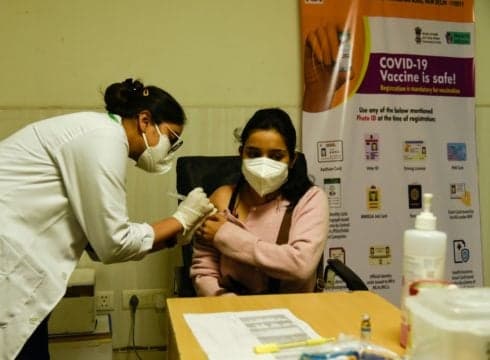In the first phase of the vaccination drive, an estimated 3 Cr healthcare and frontline workers will get vaccinated, according to the health ministry
If a person uses their Aadhaar card to register for vaccination, the authorities will use this to generate a UHID for the individual
However, in its rules for vaccinating healthcare workers, the centre also talked about ‘legal implications of using Aadhaar as ID proof’
Inc42 Daily Brief
Stay Ahead With Daily News & Analysis on India’s Tech & Startup Economy
The central government is looking at the Covid-19 vaccination drive, to be kicked off countrywide from January 16, as a way to generate digital unique health identification (UHID) numbers for citizens linked to their Aadhaar cards.
In the first phase of the vaccination drive, an estimated 3 Cr healthcare and frontline workers will get vaccinated, according to the health ministry.
According to media reports, if a person uses their Aadhaar card to register for vaccination, the authorities will use this to generate a UHID for the individual.
On January 1 this year, the health ministry issued a gazette notification which said that Aadhaar authentication will be used on a voluntary basis to create UHIDs for those citizens getting the vaccine. However, in its rules for vaccinating healthcare workers, the centre also talked about ‘legal implications of using Aadhaar as ID proof’.
Moreover, under the ‘frequently asked questions’ column on covid19.karnataka.gov.in — the Karnataka government’s portal for registration of healthcare workers for Covid-19 vaccination — it is stated, “Never take Aadhaar details into the Excel sheet. It has legal implications. Hence it is not listed in the Photo ID drop-down menu.”
The UHIDs or digital health IDs are part of the centre’s National Digital Health Mission (NDHM). The health IDs will work as each citizen’s digital health record, encapsulating their medical history, personal health and electronic medical records, diagnosis, and other relevant data to inform better health treatment. These Health IDs could be integrated with one’s Aadhaar or mobile number and would help the central government target the key beneficiaries for its welfare schemes.
Understandably, the Covid-19 vaccination program will be the perfect opportunity to get health IDs for several citizens since a large mass of the population will get vaccinated under the program.
Health commissioner Pankaj Kumar Pandey told TOI, which first reported the development, that the decision of using Aadhaar to generate digital health IDs was the centre’s decision while maintaining that it was optional. However, the Private Hospitals and Nursing Homes Association (PHANA) noted that private sector healthcare workers didn’t provide their Aadhaar while registering for the vaccination drives, since it wasn’t listed as a valid ID proof.
“We had no clue that the government was planning to generate UHIDs,” PHANA president HM Prasanna told the publication.
In December, the centre approved NDHM’s health data management policy, meant to set out the minimum standard in data privacy protection, for all participants in the National Digital Health Ecosystem (NDHE).
Experts have raised concerns about the passing of the health data management policy before India gets its personal data protection law.
There is also the matter of the de facto mandatory nature of the Digital Health ID program, even though the government and its policy state otherwise. Recently, a Caravan report talked about doctors in Chandigarh’s Post-Graduate Institute of Medical Education and Research being asked to mandatorily register for the programme. Experts Inc42 spoke to, felt that the Digital Health ID program could be very similar to Aadhaar, which is also ‘voluntary’ on paper, but made mandatory by certain institutions, both government-owned and private.
{{#name}}{{name}}{{/name}}{{^name}}-{{/name}}
{{#description}}{{description}}...{{/description}}{{^description}}-{{/description}}
Note: We at Inc42 take our ethics very seriously. More information about it can be found here.


